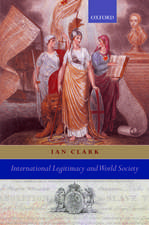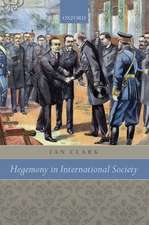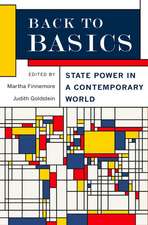Legitimacy in International Society
Autor Ian Clarken Limba Engleză Paperback – 6 sep 2007
| Toate formatele și edițiile | Preț | Express |
|---|---|---|
| Paperback (1) | 359.44 lei 31-37 zile | |
| Oxford University Press – 6 sep 2007 | 359.44 lei 31-37 zile | |
| Hardback (1) | 628.68 lei 31-37 zile | |
| OUP OXFORD – 24 feb 2005 | 628.68 lei 31-37 zile |
Preț: 359.44 lei
Preț vechi: 415.14 lei
-13% Nou
Puncte Express: 539
Preț estimativ în valută:
68.79€ • 74.69$ • 57.78£
68.79€ • 74.69$ • 57.78£
Carte tipărită la comandă
Livrare economică 11-17 aprilie
Preluare comenzi: 021 569.72.76
Specificații
ISBN-13: 9780199219193
ISBN-10: 0199219192
Pagini: 290
Dimensiuni: 156 x 233 x 16 mm
Greutate: 0.69 kg
Editura: Oxford University Press
Colecția OUP Oxford
Locul publicării:Oxford, United Kingdom
ISBN-10: 0199219192
Pagini: 290
Dimensiuni: 156 x 233 x 16 mm
Greutate: 0.69 kg
Editura: Oxford University Press
Colecția OUP Oxford
Locul publicării:Oxford, United Kingdom
Recenzii
Review from previous edition Legitimacy in International Society is an immensely scholarly work, well researched and closely argued.
Ian Clark's book offers the most comprehensive analysis of legitimacy in international relations available today, in the process breathing new life into the concept of international society. Few international relations scholars today can demonstrate such range and relevance.
In this work, Clark achieves the objective of showing how legitimacy is intrinsically connected to international society.
This book constitutes a sound study of the role of legitimacy in the international realm.
Clark provides one of the most systematic and historically informed accounts of international legitimacy to appear in many years.
Ian Clark's contribution is a theoretically sophisticated, historically rooted and timely work, that justly proclaims itself the most sustained treatment of the concept of legitimacy yet attempted in an International Relations context.
In short, this is a superb, provocative volume that has in one swoop placed legitimacy firmly on the agenda and significantly raised the intellectual bar on its study. It is essential and rewarding reading.
Ian Clark's Legitimacy in International Society is a timely contribution...Clark has provided us with a rich understanding of the role of this concept in IR, and in doing so has secured its place in the English Schools lexicon
Clark's book deserves a wide reading. He seamlessly incorporates history and theory into an insightful analysis of an important concept.
Ian Clark's exceptionally interesting book should reinvigorate the debate about the nature of legitimacy in the rapidly evolving international context. This important book deserves a significant audience.
Ian Clark's book offers the most comprehensive analysis of legitimacy in international relations available today, in the process breathing new life into the concept of international society. Few international relations scholars today can demonstrate such range and relevance.
In this work, Clark achieves the objective of showing how legitimacy is intrinsically connected to international society.
This book constitutes a sound study of the role of legitimacy in the international realm.
Clark provides one of the most systematic and historically informed accounts of international legitimacy to appear in many years.
Ian Clark's contribution is a theoretically sophisticated, historically rooted and timely work, that justly proclaims itself the most sustained treatment of the concept of legitimacy yet attempted in an International Relations context.
In short, this is a superb, provocative volume that has in one swoop placed legitimacy firmly on the agenda and significantly raised the intellectual bar on its study. It is essential and rewarding reading.
Ian Clark's Legitimacy in International Society is a timely contribution...Clark has provided us with a rich understanding of the role of this concept in IR, and in doing so has secured its place in the English Schools lexicon
Clark's book deserves a wide reading. He seamlessly incorporates history and theory into an insightful analysis of an important concept.
Ian Clark's exceptionally interesting book should reinvigorate the debate about the nature of legitimacy in the rapidly evolving international context. This important book deserves a significant audience.
Notă biografică
Educated at Glasgow University and Australian National University. Professor of International Politics at Aberystwyth since 1998. 1984-1997 University of Cambridge. Fellow of the British Academy. Honorary Fellow of Selwyn College, Cambridge. Author of several books from OUP, including Legitimacy in International Society, The Post-Cold War Order, Globalization and the Theory of International Relations; and Globalization and Fragmentation.

















